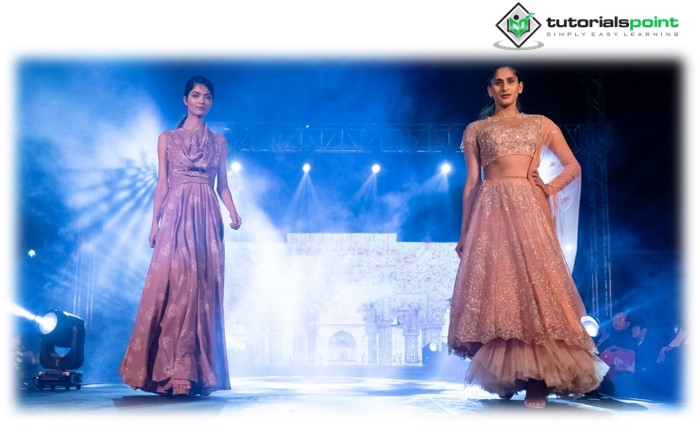

Anyone who even remotely follows the industry is aware that high fashion isn’t just confined to the four cities that are typically referred to as “fashion capitals”: Paris, Milan, New York, and London. This seemingly obvious conclusion serves as the starting point for the newest exhibition at The Museum at FIT, “Global Fashion Capitals,” which is on display through November 14. It brings together an intriguing, if not entirely cohesive, collection of both new and vintage clothing from around the globe. The exhibition features work by designers from a variety of cities, including Sydney, Kiev, Lagos, New Delhi, and Sao Paolo, whose influence on fashion has grown recently.

The most striking pieces in the collection are created by young, emerging designers who have opted to work in their home nations, like Nigerian designer Lisa Folawiyo, whose feminine interpretation of regional traditional fabrics is shown above left. The show’s co-organizers, curatorial assistant Elizabeth Way and assistant curator Arielle Elia, noted that “there are literally hundreds of fashion weeks around the world” and described the presentation as “just a little dose of what’s going on.” Los Angeles, which is increasingly asserting its influence in the fashion world, is just one of many cities that could be considered modern fashion capitals but aren’t mentioned in the exhibit.
A city with a major fashion sector and a considerable impact on world fashion trends is considered a fashion capital. Paris, New York, London, Milan, Berlin, Tokyo, Rome, Hong Kong, Barcelona, Los Angeles, Shanghai, and Sao Paulo are among the frequently mentioned fashion capitals. The following traits are present in most fashion capitals
Localized fashion designers that gain popularity and recognition Some places seem to foster an environment for creativity that attracts gifted fashion designers.
Fashion companies that decide to establish their city headquarters, design hubs, and flagship sites
Fashion events, commonly referred to as "fashion weeks," are held in fashion capitals and give local designers a lot of exposure in publications like fashion magazines and blogs. Fashion weeks are usually held twice a year, once in the spring/summer season and once in the fall/winter season. The most well-known fashion capitals, including Paris, New York, London, Berlin, and Milan, host these events. Publicity for brands and goods is generated during fashion weeks. Presentations can be extensive and include theatrical elements like special effects. They might include one-of-a-kind haute couture pieces intended to display a designer’s creativity. As an alternative, they might offer readily available ready-to-wear items.
Locals in fashion capitals frequently support the business and contribute to the creative atmosphere by creating unique street and subculture outfits.
Fashion week attendees and tourists drawn to local boutiques and a city’s overall fashion scene frequent fashion capitals.
Charles Frederick Worth was the first designer to have his label stitched onto the clothing that he made, and as a result, the contemporary business, which is structured upon firms or fashion houses owned by individual designers, was born in the 19th century. He served as Austrian Queen Elisabeth’s official designer. Marie Antoinette, the Queen of France, had her clothes made by Rose Berlin. She was occasionally referred to as the minister of fashion. She established a store in Paris and significantly influenced the city’s fashion up until the French Revolution, when she fled to exile in London for a while. France was the world’s first major fashion hub and continues to be so today. The interwar years, which are frequently referred to as the "Golden Age of French Fashion," saw significant reform and change. Heabbe Lanvin and Jean Paton were two other notable French fashion designers of the 1920s.
London, Milan, Paris, and New York City are the current “fashion capitals,” along with other places. These cities not only have a vibrant fashion scene and a large number of fashion industry experts living there, but they also have distinctive street fashion. Each of these cities hosts fashion-related events and is the source of many of the current fashion trends. The “Global Language Monitors” poll has been used to determine which country has had the most significant influence on fashion over the past ten years. And this year, New York edged out Paris to claim the title of Top Global Fashion Capital from London. The championship was held in London in 2011 and 2012.
The Top Global Fashion Capital for Haute Couture award went to Paris, which also placed second overall. The difference between New York and Paris was 0.05%, the smallest in the survey’s 10-year history. New York City is the top fashion city in the world due to its geographic location in the middle of the globe and proximity to both the west coast of the US and Europe. Italy has a significant impact on fashion, and two of its largest cities have some of the most significant global fashion influences. Rome is not only visited by tourists; it is also a popular destination for fashionistas worldwide. Milan is one of the top fashion cities in the world because of its location right next to Rome and its proximity to so many other diverse cultures and nations in Europe. One of the top fashion cities in the world has always been London. London is home to some of the world’s most talented designers and numerous fashion outlets. It has easy access to many other European fashion cities because it is located in Europe.
The globe is more united thanks to fashion capitals; during the world-famous fashion weeks in Milan, New York City, and other cities, people from all over the world congregate on a single platform to discuss fashion. Everything that is fashionable in our time is liked and valued throughout the world. Fashion capitals serve as definitions of popular culture and as sources of inspiration for our society’s social norms. View maternity wear, metrosexual clothing, plus-sized models, and other categories. All of them serve as examples of how our culture accommodates different social strata and inspires people from all walks of life.